|
|
|
Sort Order |
|
|
|
Items / Page
|
|
|
|
|
|
|
| Srl | Item |
| 1 |
ID:
142694
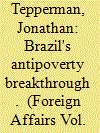

|
|
|
|
|
| Summary/Abstract |
In recent years, as public anxiety over growing inequality has intensified, policymakers and academics have started scrambling for some increasingly extreme solutions. India, for example, has launched massive programs to provide the poor with food and jobs, and the French economist Thomas Piketty has famously proposed a redistributive global wealth tax .
|
|
|
|
|
|
|
|
|
|
|
|
|
|
|
|
| 2 |
ID:
142692
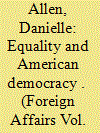

|
|
|
|
|
| Summary/Abstract |
Since the trend toward rising economic inequality [1] in the United States became apparent in the 1990s, scholars and commentators have heatedly debated its causes and consequences. What has been less evident is a vigorous positive discussion about what equality means and how it might be pursued.
|
|
|
|
|
|
|
|
|
|
|
|
|
|
|
|
| 3 |
ID:
142703
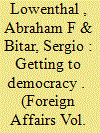

|
|
|
|
|
| Summary/Abstract |
Almost five years ago, mass protests swept the Egyptian autocrat Hosni Mubarak from power. Most local and foreign observers believed that Egypt was on the path to a democratic future; some even proclaimed that democracy had arrived. But the election of Mohamed Morsi and the Muslim Brotherhood’s Freedom and Justice Party led to polarization and violence, and in 2013, after more mass protests, General Abdel Fattah el-Sisi seized power in a military coup. Since then, Sisi’s regime has killed more than 1,000 civilians, imprisoned tens of thousands more, and cracked down on media and civil society.
|
|
|
|
|
|
|
|
|
|
|
|
|
|
|
|
| 4 |
ID:
142699


|
|
|
|
|
| Summary/Abstract |
Since the end of the Cold War, two main views have tended to define Western assessments of the Chinese-Russian relationship and predictions of its future. The first view holds that the link between Beijing and Moscow is vulnerable, contingent, and marked by uncertainties—a “marriage of convenience,” to use the phrase favored by many advocates of this argument, who see it as unlikely that the two countries will grow much closer and quite possible that they will begin to drift apart. The other view posits that strategic and even ideological factors form the basis of Chinese-Russian ties and predicts that the two countries—both of which see the United States as a possible obstacle to their objectives—will eventually form an anti-U.S., anti-Western alliance.
|
|
|
|
|
|
|
|
|
|
|
|
|
|
|
|
| 5 |
ID:
142691


|
|
|
|
|
| Summary/Abstract |
There has been much discussion of rising economic inequality in the developed world recently, along with a generalized sense that the problem has grown to intolerable proportions [2]. But at the same time, there has been little movement to address the situation; instead, there is tacit acceptance of many specific forms of inequality and the processes that produce it. The result is widespread discontent together with practical passivity.
|
|
|
|
|
|
|
|
|
|
|
|
|
|
|
|
| 6 |
ID:
142693


|
|
|
|
|
| Summary/Abstract |
As growth slows in mature economies across the developed world, economic inequality has reached new heights . Defined in terms of the shares of disposable income of households across the economic spectrum, adjusted for varying needs, inequality today in the United States is significantly higher than it was a generation ago. The same is true in the United Kingdom, and even less laissez-faire countries, such as Germany and Sweden, have seen inequality increase dramatically.
|
|
|
|
|
|
|
|
|
|
|
|
|
|
|
|
| 7 |
ID:
142690
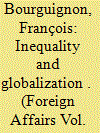

|
|
|
|
|
| Summary/Abstract |
When it comes to wealth and income, people tend to compare themselves to the people they see around them rather than to those who live on the other side of the world. The average Frenchman, for example, probably does not care how many Chinese exceed his own standard of living, but that Frenchman surely would pay attention if he started lagging behind his fellow citizens. Yet when thinking about inequality, it also makes sense to approach the world as a single community . accounting, for example, not only for the differences in living standards within France but also for those between rich French people and poor Chinese (and poor French and rich Chinese).
|
|
|
|
|
|
|
|
|
|
|
|
|
|
|
|
| 8 |
ID:
142689
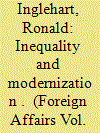

|
|
|
|
|
| Summary/Abstract |
During the past century, economic inequality in the developed world has traced a massive U-shaped curve—starting high, curving downward, then curving sharply back up again. In 1915, the richest one percent of Americans earned roughly 18 percent of all national income. Their share plummeted in the 1930s and remained below ten percent through the 1970s, but by 2007, it had risen to 24 percent. Looking at household wealth rather than income, the rise of inequality has been even greater, with the share owned by the top 0.1 percent increasing to 22 percent from nine percent three decades ago. In 2011, the top one percent of U.S. households controlled 40 percent of the nation’s entire wealth. And while the U.S. case may be extreme, it is far from unique: all but a few of the countries of the Organization for Economic Cooperation and Development for which data are available experienced rising income inequality (before taxes and transfers) during the period from 1980 to 2009.
|
|
|
|
|
|
|
|
|
|
|
|
|
|
|
|
| 9 |
ID:
142704


|
|
|
|
|
| Summary/Abstract |
Today the picture looks very different. Latin America’s economies are grinding to a halt: in 2015, average GDP growth slipped below one percent. Inequality is still declining, but more slowly. And according to the annual Latinobarómetro poll, satisfaction with democracy in Latin America is lower than it is in any other region and is at its lowest point in almost a decade, at 37 percent. In Brazil and Mexico, it has descended to just 21 percent and 19 percent, respectively
|
|
|
|
|
|
|
|
|
|
|
|
|
|
|
|
| 10 |
ID:
142701


|
|
|
|
|
| Summary/Abstract |
After Russia seized Crimea from Ukraine in March 2014, the Obama administration responded with what has become the go-to foreign policy tool these days: targeted sanctions . The United States placed asset freezes and travel bans on more than one hundred people, mostly cronies of Russian President Vladimir Putin , and the EU targeted almost a hundred more. The amounts involved have been massive: Bank Rossiya, the Kremlin’s preferred bank, had $572 million frozen in the months after the sanctions were rolled out. Then, in July 2014, when Malaysia Airlines Flight 17 was shot down over eastern Ukraine allegedly by Russian-backed forces , Washington responded with more severe sanctions aimed at key sectors of the Russian economy, including arms manufacturers, banks, and state firms. In an effort to hit the Kremlin where it hurts, the measures inhibit financing and technology transfers to Russian oil and gas companies, which supply over half of state revenues.
|
|
|
|
|
|
|
|
|
|
|
|
|
|
|
|
| 11 |
ID:
142695
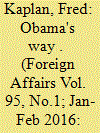

|
|
|
|
|
| Summary/Abstract |
On January 28, 2009, barely a week into his presidency, Barack Obama met with the U.S. military’s top generals and admirals on their own turf, inside “the tank,” the Joint Chiefs of Staff’s conference room on the second floor of the Pentagon. A senior official recalled the new president as “remarkably confident—composed, relaxed, but also deferential, not trying to act too much the commander in chief.” Obama walked around the room, introducing himself to everyone; he thanked them and the entire armed forces for their service and sacrifice; then he sat down for a freewheeling discussion of the world’s challenges, region by region, crisis by crisis . He was “the man in full,” the official said, fluent on every issue, but more than that—a surprise to the officers, who had been leery of this young, inexperienced Democrat —he displayed a deep streak of realism.
|
|
|
|
|
|
|
|
|
|
|
|
|
|
|
|
| 12 |
ID:
142698


|
|
|
|
|
| Summary/Abstract |
Since the early 1990s, daily life in poor countries has been changing profoundly for the better: one billion people have escaped extreme poverty , average incomes have doubled, infant death rates have plummeted, millions more girls have enrolled in school, chronic hunger has been cut almost in half, deaths from malaria and other diseases have declined dramatically, democracy has spread far and wide, and the incidence of war —even with Syria and other conflicts—has fallen by half. This unprecedented progress goes way beyond China and India and has touched hundreds of millions of people in dozens of developing countries across the globe, from Mongolia to Mozambique, Bangladesh to Brazil.
|
|
|
|
|
|
|
|
|
|
|
|
|
|
|
|
| 13 |
ID:
142700


|
|
|
|
|
| Summary/Abstract |
At the end of September, Russia began conducting air strikes in Syria , ostensibly to combat terrorist groups. The strikes constitute Russia’s biggest intervention in the Middle East in decades. Its unanticipated military foray into Syria has transformed the civil war there into a proxy U.S.-Russian conflict and has raised the stakes in the ongoing standoff between Moscow and Washington. It has also succeeded in diverting attention away from Russia’s destabilization of Ukraine, making it impossible for the West to continue to isolate the Kremlin. Russia is now a player in the Syrian crisis, and the United States will have to find a way to deal with it .
|
|
|
|
|
|
|
|
|
|
|
|
|
|
|
|
| 14 |
ID:
142696


|
|
|
|
|
| Summary/Abstract |
The nuclear deal that the United States and five other great powers signed with Iran in July 2015 [1] is the final product of a decadelong effort at arms control. That effort included sanctions in an attempt to impede Iran’s quest for a nuclear weapons capability. The Joint Comprehensive Plan of Action , or JCPOA, ranks as one of the most deficient arms control agreements in history. But U.S. President Barack Obama has pledged to spend the remainder of his tenure fending off congressional pressures to adjust its terms
|
|
|
|
|
|
|
|
|
|
|
|
|
|
|
|
| 15 |
ID:
142702
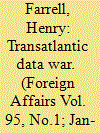

|
|
|
|
|
| Summary/Abstract |
Last October, the European Court of Justice struck down the Safe Harbor agreement , a 15-year-old transatlantic arrangement that permitted U.S. companies to transfer data, such as people’s Google-search histories, outside the EU. In invalidating the agreement, the ECJ found that the blurry relationship between private-sector data collection and national security in the United States violates the privacy rights of EU citizens whose data travel overseas. The decision leaves U.S. technology companies with extensive international operations on shaky legal ground.
|
|
|
|
|
|
|
|
|
|
|
|
|
|
|
|
| 16 |
ID:
142697


|
|
|
|
|
| Summary/Abstract |
The scholar Edward Corwin famously described the separation of powers between the executive and the legislative branches set out in the U.S. Constitution as “an invitation to struggle for the privilege of directing American foreign policy.” With different parties controlling different branches of government, partisan politics tends to intensify this struggle, and the consequences can be ugly. These days, for example, hardly a week seems to go by without vicious sniping between the Obama administration and Republicans in Congress over one issue or another—from China to Russia, Iran to Syria, Cuba to Israel. And on most issues, process as well as discourse has broken down, with each side openly trying to thwart or bypass the other.
|
|
|
|
|
|
|
|
|
|
|
|
|
|
|
|
|
|
|
|
|